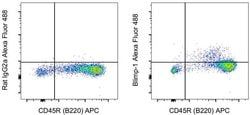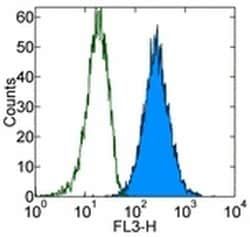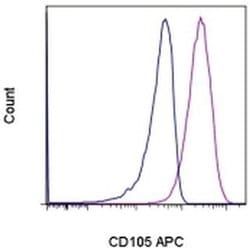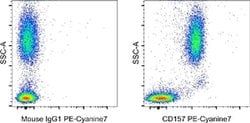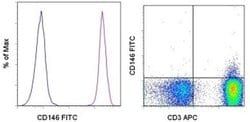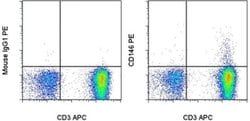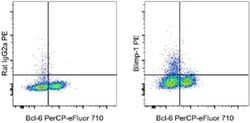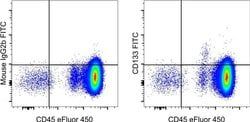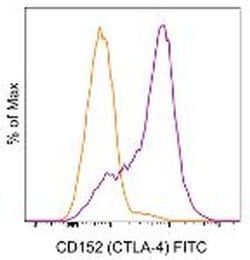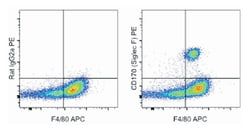7078442
CD133 (Prominin-1) Monoclonal Antibody (EMK08), FITC, eBioscience™, Invitrogen™
Mouse Monoclonal Antibody
Manufacturer: Fischer Scientific
The price for this product is unavailable. Please request a quote
Antigen
CD133 (Prominin-1)
Concentration
5 μL/Test
Classification
Monoclonal
Form
Liquid
Regulatory Status
RUO
Formulation
PBS with 0.2% BSA and 0.09% sodium azide
Gene Alias
4932416E19Rik; AC133; Antigen AC133; antigen AC133 homolog; antigen CD133; CD107b; CD133; CORD12; fudenine; hematopoietic stem cell antigen; hProminin; Lamp II; Lamp2; LAMP-2; Lamp-2a; Lamp-2b; Lamp-2c; LGP-96; LGP-B; Mac3; MCDR2; MSTP061; Prom; PROM1; Prom-1; prominin 1; prominin 1.s1; Prominin1; prominin-1; prominin-1.s2; prominin-like 1; prominin-like protein 1; PROML1; RP41; STGD4
Gene Symbols
PROM1
Primary or Secondary
Primary
Content And Storage
4° C, store in dark, DO NOT FREEZE!
Gene
PROM1
Clone
EMK08
Applications
Flow Cytometry
Conjugate
FITC
Host Species
Mouse
Target Species
Human
Gene Accession No.
O43490
Gene ID (Entrez)
8842
Isotype
IgG2b κ
Purification Method
Affinity chromatography
Product Type
Antibody
Description
- The EMK08 monoclonal antibody reacts with human CD133 (Prominin-1), a 120 kDa member of the pentaspan family of proteins, which also includes Prominin-2
- Their expression is found within plasma membrane protrusions such as epithelial microvilli
- CD133 can exist in a number of alternatively spliced isoforms, and the protein has several N-linked glycosylation sites; the occurrence of both may be tissue-dependent
- Human CD133 was first identified as an epitope expressed on CD34+ hematopoietic progenitors
- Although the ligand and function of CD133 remain unknown, it has since proven to be very useful as a marker for both stem cells and cancer stem cells
- In addition to its expression on hematopoietic precursors, CD133 has been used to identify tumorigenic colon cancer stem cells, brain cancer stem cells, prostate cancer stem cells, in addition to others
- The binding of the EMK08 antibody does not block the binding of another anti-human CD133 antibody, TMP4 (cat
- 12-1338) indicating that they recognize distinct epitopes
- This EMK08 antibody has been pre-titrated and tested by flow cytometric analysis of normal human peripheral blood cells
- This can be used at 5 μL (0.06 μg) per test
- A test is defined as the amount (μg) of antibody that will stain a cell sample in a final volume of 100 μL
- Cell number should be determined empirically but can range from 10^5 to 10^8 cells/test
- Filtration: 0.2 μm post-manufacturing filtered
- The CD133 (AC133) antigen is a 97 kDa glycoprotein, with 5 transmembrane domains, that shows up as a 120 kDa band on protein gels due to glycosylation
- CD133 is a cell surface marker expressed by immature hematopoietic stem cells but not mature blood cells
- In addition to hematopoietic stem and progenitor cells, CD133 has been found to be a marker for other stem and progenitor cells including neural and embryonic stem cells
- CD133 has been shown to be expressed in cancers, including some leukemias and brain tumors, that may be derived from stem cells
- Low level expression could also be detected in the kidney, pancreas, placenta, and fetal liver
- Mutations in this gene have been shown to result in retinitis pigmentosa and Stargardt disease
- Expression of the CD133 gene is also associated with several types of cancer
- CD133 is expressed from at least five alternative promoters that are expressed in a tissue-dependent manner, and multiple transcript variants encoding different isoforms have been found.
Compare Similar Items
Show Difference
Antigen: CD133 (Prominin-1)
Concentration: 5 μL/Test
Classification: Monoclonal
Form: Liquid
Regulatory Status: RUO
Formulation: PBS with 0.2% BSA and 0.09% sodium azide
Gene Alias: 4932416E19Rik; AC133; Antigen AC133; antigen AC133 homolog; antigen CD133; CD107b; CD133; CORD12; fudenine; hematopoietic stem cell antigen; hProminin; Lamp II; Lamp2; LAMP-2; Lamp-2a; Lamp-2b; Lamp-2c; LGP-96; LGP-B; Mac3; MCDR2; MSTP061; Prom; PROM1; Prom-1; prominin 1; prominin 1.s1; Prominin1; prominin-1; prominin-1.s2; prominin-like 1; prominin-like protein 1; PROML1; RP41; STGD4
Gene Symbols: PROM1
Primary or Secondary: Primary
Content And Storage: 4° C, store in dark, DO NOT FREEZE!
Gene: PROM1
Clone: EMK08
Applications: Flow Cytometry
Conjugate: FITC
Host Species: Mouse
Target Species: Human
Gene Accession No.: O43490
Gene ID (Entrez): 8842
Isotype: IgG2b κ
Purification Method: Affinity chromatography
Product Type: Antibody
Antigen:
CD133 (Prominin-1)
Concentration:
5 μL/Test
Classification:
Monoclonal
Form:
Liquid
Regulatory Status:
RUO
Formulation:
PBS with 0.2% BSA and 0.09% sodium azide
Gene Alias:
4932416E19Rik; AC133; Antigen AC133; antigen AC133 homolog; antigen CD133; CD107b; CD133; CORD12; fudenine; hematopoietic stem cell antigen; hProminin; Lamp II; Lamp2; LAMP-2; Lamp-2a; Lamp-2b; Lamp-2c; LGP-96; LGP-B; Mac3; MCDR2; MSTP061; Prom; PROM1; Prom-1; prominin 1; prominin 1.s1; Prominin1; prominin-1; prominin-1.s2; prominin-like 1; prominin-like protein 1; PROML1; RP41; STGD4
Gene Symbols:
PROM1
Primary or Secondary:
Primary
Content And Storage:
4° C, store in dark, DO NOT FREEZE!
Gene:
PROM1
Clone:
EMK08
Applications:
Flow Cytometry
Conjugate:
FITC
Host Species:
Mouse
Target Species:
Human
Gene Accession No.:
O43490
Gene ID (Entrez):
8842
Isotype:
IgG2b κ
Purification Method:
Affinity chromatography
Product Type:
Antibody
Antigen: CD152 (CTLA-4)
Concentration: 5 μL/Test
Classification: Monoclonal
Form: Liquid
Regulatory Status: RUO
Formulation: PBS with 0.2% BSA and 0.09% sodium azide; pH 7.2
Gene Alias: ALPS5; CD; CD152; CD152 antigen; CD152 isoform; CD152 protein; CD152 protein precursor; celiac disease 3; CELIAC3; Ctla4; CTLA-4; cytotoxic T lymphocyte associated antigen 4 short spliced form; cytotoxic T-lymphocyte associated protein 4; cytotoxic T-lymphocyte protein 4; cytotoxic T-lymphocyte protein 4 isoform CTLA4-TM; cytotoxic T-lymphocyte-associated antigen 4; cytotoxic T-lymphocyte-associated protein 4; cytotoxic T-lymphocyte-associated serine esterase-4; EGK_04712; GRD4; GSE; ICOS; IDDM12; insulin-dependent diabetes mellitus 12; ligand and transmembrane spliced cytotoxic T lymphocyte associated antigen 4; Ly-56; sCTLA4; soluble form; transmembrane form
Gene Symbols: CTLA4
Primary or Secondary: Primary
Content And Storage: 4° C, store in dark, DO NOT FREEZE!
Gene: CTLA4
Clone: 14D3
Applications: Flow Cytometry
Conjugate: FITC
Host Species: Mouse
Target Species: Human, Rhesus Monkey
Gene Accession No.: P16410
Gene ID (Entrez): 1493, 705673
Isotype: IgG2a κ
Purification Method: Affinity chromatography
Product Type: Antibody
Antigen:
CD152 (CTLA-4)
Concentration:
5 μL/Test
Classification:
Monoclonal
Form:
Liquid
Regulatory Status:
RUO
Formulation:
PBS with 0.2% BSA and 0.09% sodium azide; pH 7.2
Gene Alias:
ALPS5; CD; CD152; CD152 antigen; CD152 isoform; CD152 protein; CD152 protein precursor; celiac disease 3; CELIAC3; Ctla4; CTLA-4; cytotoxic T lymphocyte associated antigen 4 short spliced form; cytotoxic T-lymphocyte associated protein 4; cytotoxic T-lymphocyte protein 4; cytotoxic T-lymphocyte protein 4 isoform CTLA4-TM; cytotoxic T-lymphocyte-associated antigen 4; cytotoxic T-lymphocyte-associated protein 4; cytotoxic T-lymphocyte-associated serine esterase-4; EGK_04712; GRD4; GSE; ICOS; IDDM12; insulin-dependent diabetes mellitus 12; ligand and transmembrane spliced cytotoxic T lymphocyte associated antigen 4; Ly-56; sCTLA4; soluble form; transmembrane form
Gene Symbols:
CTLA4
Primary or Secondary:
Primary
Content And Storage:
4° C, store in dark, DO NOT FREEZE!
Gene:
CTLA4
Clone:
14D3
Applications:
Flow Cytometry
Conjugate:
FITC
Host Species:
Mouse
Target Species:
Human, Rhesus Monkey
Gene Accession No.:
P16410
Gene ID (Entrez):
1493, 705673
Isotype:
IgG2a κ
Purification Method:
Affinity chromatography
Product Type:
Antibody
Antigen: CD170 (Siglec F)
Concentration: 0.2 mg/mL
Classification: Monoclonal
Form: Liquid
Regulatory Status: RUO
Formulation: PBS with 0.09% sodium azide; pH 7.2
Gene Alias: CD170; CD33 antigen-like 2; CD33L2; mSiglec-F; OB-binding protein 2; OBBP2; OB-BP2; Obesity-binding protein 2; sialic acid binding Ig like lectin 5; sialic acid binding Ig-like lectin 5; sialic acid binding Ig-like lectin F; sialic acid-binding Ig-like lectin 5; Sialic acid-binding Ig-like lectin F; sialic acid-binding immunoglobulin-like lectin 5; sialic acid-binding lectin Siglec-F; Siglec; SIGLEC5; siglec-5; Siglecf; Siglec-F
Gene Symbols: Siglecf
Primary or Secondary: Primary
Content And Storage: 4° C, store in dark, DO NOT FREEZE!
Gene: Siglecf
Clone: 1RNM44N
Applications: Flow Cytometry
Conjugate: PE
Host Species: Rat
Target Species: Mouse
Gene Accession No.: Q920G3
Gene ID (Entrez): 233186
Isotype: IgG2a κ
Purification Method: Affinity chromatography
Product Type: Antibody
Antigen:
CD170 (Siglec F)
Concentration:
0.2 mg/mL
Classification:
Monoclonal
Form:
Liquid
Regulatory Status:
RUO
Formulation:
PBS with 0.09% sodium azide; pH 7.2
Gene Alias:
CD170; CD33 antigen-like 2; CD33L2; mSiglec-F; OB-binding protein 2; OBBP2; OB-BP2; Obesity-binding protein 2; sialic acid binding Ig like lectin 5; sialic acid binding Ig-like lectin 5; sialic acid binding Ig-like lectin F; sialic acid-binding Ig-like lectin 5; Sialic acid-binding Ig-like lectin F; sialic acid-binding immunoglobulin-like lectin 5; sialic acid-binding lectin Siglec-F; Siglec; SIGLEC5; siglec-5; Siglecf; Siglec-F
Gene Symbols:
Siglecf
Primary or Secondary:
Primary
Content And Storage:
4° C, store in dark, DO NOT FREEZE!
Gene:
Siglecf
Clone:
1RNM44N
Applications:
Flow Cytometry
Conjugate:
PE
Host Species:
Rat
Target Species:
Mouse
Gene Accession No.:
Q920G3
Gene ID (Entrez):
233186
Isotype:
IgG2a κ
Purification Method:
Affinity chromatography
Product Type:
Antibody
Antigen: CD19
Concentration: 5 μL/Test
Classification: Monoclonal
Form: Liquid
Regulatory Status: RUO
Formulation: PBS with BSA and 0.09% sodium azide; pH 7.2
Gene Alias: AW495831; B4; B-lymphocyte antigen CD19; B-lymphocyte surface antigen B4; Cd19; CD19 antigen; CD19 molecule; CVID3; differentiation antigen CD19; Leu-12; T-cell surface antigen Leu-12
Gene Symbols: Cd19
Primary or Secondary: Primary
Content And Storage: 4° C, store in dark, DO NOT FREEZE!
Gene: Cd19
Clone: HIB19
Applications: Flow Cytometry
Conjugate: Super Bright 436
Host Species: Mouse
Target Species: Human
Gene Accession No.: P15391
Gene ID (Entrez): 930
Isotype: IgG1 κ
Purification Method: Affinity chromatography
Product Type: Antibody
Antigen:
CD19
Concentration:
5 μL/Test
Classification:
Monoclonal
Form:
Liquid
Regulatory Status:
RUO
Formulation:
PBS with BSA and 0.09% sodium azide; pH 7.2
Gene Alias:
AW495831; B4; B-lymphocyte antigen CD19; B-lymphocyte surface antigen B4; Cd19; CD19 antigen; CD19 molecule; CVID3; differentiation antigen CD19; Leu-12; T-cell surface antigen Leu-12
Gene Symbols:
Cd19
Primary or Secondary:
Primary
Content And Storage:
4° C, store in dark, DO NOT FREEZE!
Gene:
Cd19
Clone:
HIB19
Applications:
Flow Cytometry
Conjugate:
Super Bright 436
Host Species:
Mouse
Target Species:
Human
Gene Accession No.:
P15391
Gene ID (Entrez):
930
Isotype:
IgG1 κ
Purification Method:
Affinity chromatography
Product Type:
Antibody
